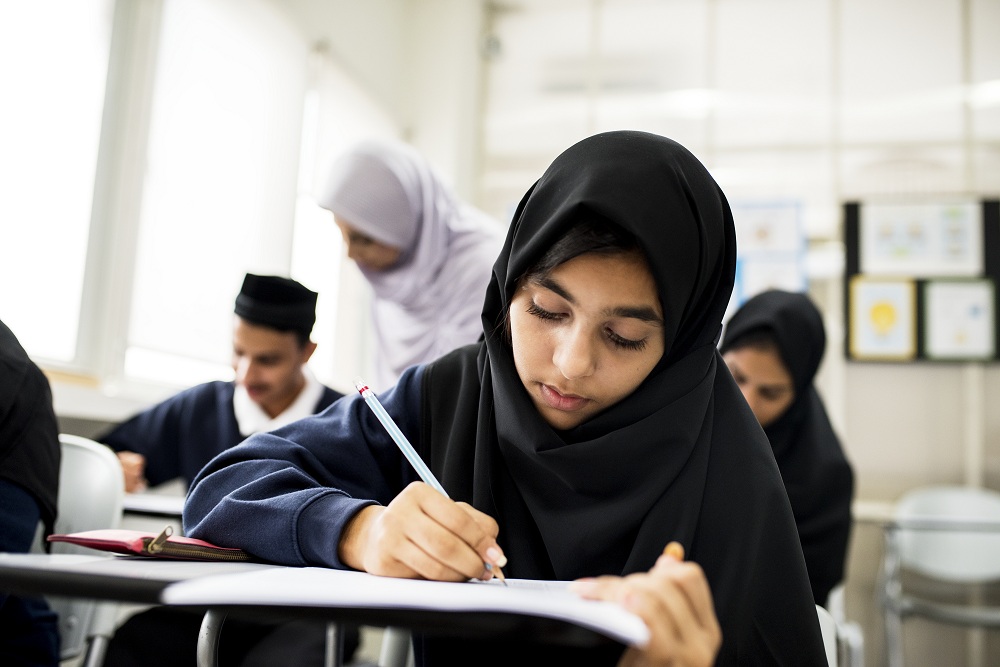
The unofficial start of the summer is here and it is a great time for parents to think about how to plan for the days and months ahead. While down time and fun should definitely be on the agenda, it is also important to ensure that the hiatus from a structured learning environment – in-person or virtual school – does not result in summer learning loss.
What Is Summer Learning Loss?
In case you have never heard that term, summer learning loss describes the regression in the previous year’s learning gains that result from a break from schooling. It has been a topic of discussion for educators and parents for more than a century. When looking at any scientific data related to summer learning research, however, there are some challenges with drawing conclusions that ring true across the board.
There are two recent studies that examined outcomes for students in kindergarten through eighth grade that offer important insights.One study is entitled “School’s Out: The Role of Summers in Understanding Achievement.” It suggests that students lose between 17 to 34 percent of the previous year’s learning gains during the summer break. While that sounds daunting, the study also acknowledges considerable difficulty in measuring outcomes and in adjusting for inequities between schools and between students on a number of levels.
Another study published as a Northwest Evaluation Association working paper entitled, “When does inequality grow? A seasonal analysis of racial/ethnic disparities in learning in kindergarten through eighth grade” starts with a recognition of disparities during the school year, particularly the school achievement gaps between Black and White students. Contrary to the previous study, the suggestion here is that gaps frequently widen during the school year, but possibly shrink during the summer months.
In addition to the range of findings between these and previous studies, educators and parents can draw their own conclusions from personal experiences. Regardless of perspective, it is widely agreed that summer learning loss seems to vary greatly, with race or ethnicity and school level-poverty explaining only some, but not all, of the variance.
Attention Should Be Focused on Reading and Math
There are two academic subjects that get the most attention when talking about summer learning loss – math and reading. Research has been conducted on the “COVID-19 slide,” the suggestion that student achievements in the classroom generally were negatively impacted by the interruption in classroom learning as a result of the pandemic. It supports the notion that, to avoid loss in learning gains, there should be a concerted effort to support continued work in these two areas during the summer.
Generally, with certain types of learning, the more you practice or use it, the better you get. This is true of both reading and writing, language acquisition and fluency, and math. Muslim parents should particularly take head. In some immigrant families where English is not the spoken language in the home, it is especially important to keep up with work on these subjects. And it is equally true for any type of Quranic Arabic study.

How to Keep the Summer Productive
Before even getting to what kinds of things can be done to keep your children productive this summer, it is important to acknowledge that learning doesn’t only take place in a classroom. That seems pretty simple, yet both parents and children get stuck in a mindset that “learning” should also be on hiatus during summer break and that learning and fun are antithetical.
That is not the case when we look deeper into the way that actually children learn. They are naturally curious about the world they live in. Think of the way a toddler learns to talk or to walk. No one sits them at a desk at a particular time each day to review the necessary steps, to point out their missteps, to revisit additional resources to aid in acquisition of a new skill. Instead, when left to their own devices they watch, they give it a try, they fall, they get back up, and try again.
We can and should substantially support each child’s organic learning, especially within the safety of our own homes. But that is a mindset and, if you as a parent are not yet there yourself, that should be the first item on your own to-do list for the summer. You will need to be convinced in order to convince your children that lifelong learning is a worthwhile pursuit and that it can be both productive and fun.
Here are 7 ways you can use the summer months to support and enhance further learning.
1. Create a family calendar.
The first step out-of-the-box is to make summer scheduling a family affair. Each member should contribute ideas, needs, and desires. There is more accountability and buy-in when everyone participates, especially from the beginning. Be sure to look at the entirety of the summer. Consider what is fixed (like travel plans) and what is flexible (because chill days are also important). Consider including opportunities for each member of the family to plan an activity or outing. Limited funds should not mean limited activity as a trip to a new park or playground can be free.
2. Factor in summer work assignments.
Examine the summer learning packets that have been assigned to your child by your school district. Remember, students at different grade levels will have different assignments, and these can easily be spaced out during the summer months. What both parents and students want to avoid is waiting until the last minute because it will make the completion of these assignments stressful at best or at worst, impossible to finish.

3. Set aside time for reading every day.
Adopt a family reading time. Modeling the behavior you are trying to cultivate speaks volumes when you are trying to create and nurture new habits. This doesn’t have to be a large amount of time but it has to be consistent. When reading is the goal, there should be one hard-and-fast rule – for pleasure reading, everyone gets to pick what they want to read. There can be reading lists to generate ideas from local schools, libraries, and even online sources. But in addition to the usual fiction and non-fiction books, include comics, graphic novels, magazines, newspapers, even blogs (you can decide as a family if online reading is okay or off-limits).
Special attention should also be given to reading the Quran every day. If children are not able to do so themselves, there are many activities to take steps in that direction. Learning the Arabic alphabet is a great place to start. Many Adam’s World classic videos can provide help here (for children and parents alike). There is a full range of old and new Adam’s World videos available at your fingertips 24/7 on our convenient Adam’s World App. Find out more about this amazing resource at adamsworld.org.
4. Explore math through everyday activities.
While you can sharpen addition skills and multiplication tables with worksheets, you can also learn and reinforce math concepts in many common activities. Think about sorting and counting using beans, using a trip to the grocery store to practice addition and subtraction skills, using fractions while cooking to upsize or downsize a recipe, using measuring to map a trip to the playground, exploring statistics while watching a basketball or baseball game. There are also tons of learning games that reinforce math concepts like Math Dice Jr., Mobi Math Whale, Money Bags, and more. There are lots of math games online, too. And If you need more structured learning tools to master higher level math functions, be sure to check out khanacademy.org, which has a wide variety of free resources for all types of learners. (And don’t forgot to check out Muslim founder Salman Khan’s personal story – his efforts to tutor his cousin Nadia in math led to the creation of this amazing global resource.)
By demonstrating that there is a purpose to learning math skills, you can help your child uncover a new love and appreciation for the subject. Remember, mathematics is one way of acknowledging the order that Allah has placed in the universe. Alhamdulillah, that is surely a mercy to us all.
5. Take advantage of summer programming.
Children all over the world have been pent-up for more than a year as a result of the pandemic. In many parts of the U.S., restrictions are relaxing and summer camps are opening this year. Check out what is available in your local area. Some offer academic remediation and skill building, while others offer extracurricular activities like art classes, robotics, swimming, etc. Some may be in-person and others are offered virtually. Consider what your children are interested in, what offers the most opportunity for socializing with other children like themselves, what you can afford, and what you can accommodate as a family.
Be sure to check out Sound Vision’s Adam’s World and Colors of Islam Club online classes. Our hosts use music, arts, storytelling, and humor to engage children in an exploration of their world through a very special Islamic lens. We are working on a full summer line-up for children ages four to 17. Check out the details for both at adamsworld.org.
6. Improve writing skills.
There are a wide variety of ways to nurture both creative writing and handwriting skills. Depending upon the child’s age, you can encourage them to write simple poems or songs, keep a journal, or write letters to friends and family members. Older children can also write letters to local politicians or businesses, advocating for a wide variety of foreign and domestic policies. There are a number of global challenges that need attention and you can learn more about them at Justiceforall.org. Many schools are no longer teaching cursive writing, but work in this area can be fun and creative. You can push the creative side further with a calligraphy lesson. The Quran’s script itself is a beautiful example of what a human hand can accomplish with attention to detail and artistry.

7. Socializing is also a must.
The pandemic has spawned a crisis in mental health issues for children of all ages. With little warning, social activities – mostly provided by in-person schooling and extracurricular activities – were completely shut down. A newfound respect for the importance of social and emotional learning has elevated the importance of skills that are learned through interaction with peers and caring adults outside of the home. Be sure to make opportunities for play time with friends, visits with family members, connections by phone or zoom for folks who live too far away to see in-person. Nurturing these relationships can help to enhance skills like self-regulation and self-awareness, persistence, empathy, and mindfulness.
The sky's the limit when it comes to the many ways that parents can nurture a lifelong love of learning. When we focus this type of attention on the children that we love, then summer learning loss will not be a challenge. Because summer learning will be a time to soar, insha Allah.
For a full read of the works cited above please see:
Schools Out: The Role of Summer in Achievement Disparities by Allison Atteberry and Andrew McEachain published in the American Education Research Journal, July 9, 2020.
When Does Inequality Grow? A seasonal analysis of racial/ethnic disparities in learning in kindergarten through eighth grade by Megan Kuhfeld, Dennis Confron, Douglas Downey, 2019.
For more ideas about productive summer fun, see these additional articles:
30 Ideas for Summer Fun (that Are Also Productive)
Recognizing the Importance of Play
10 Top Skills to Teach your Kids this Summer
(06/04/2021)



Add new comment